Festival Theaterformen 2018 "Watch & Write" - Yvon Edoumou on the question whether "poor" people can enjoy arts
Braunschweig, 8. Juni 2018
Have you eaten today?
by Yvon Edoumou
A few days ago, I attended the latest edition of the Kinshasa international theatre festival. 10 US dollars was the admission price to see one show, "Les Bonnes" ("The Housemaids"), a fabulous piece on two housemaids who want to kill their vicious employer. In Kinshasa, 10 US dollars for a show doesn't sound too much – or does it?
Or how about 20 dollar for the African classic "When Things Fall Apart" at Kinshasa's best bookstore? How about 50 dollar for a Koffi Olomide concert? How about for free? Remember: We are in Kinshasa, capital of DR Congo, a country that has occupied the lower ranks of all human development reports in over a decade.
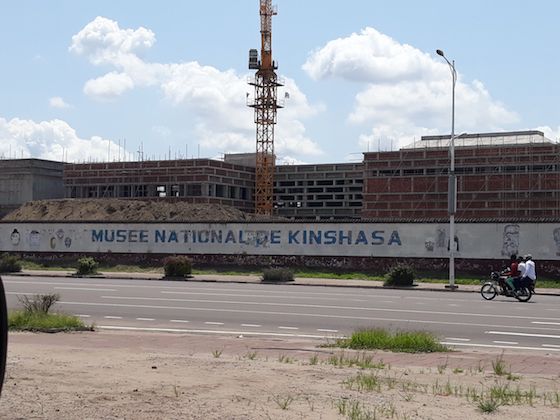 Construction is underway for a new museum in Kinshasa © Yvon Edoumou
Construction is underway for a new museum in Kinshasa © Yvon Edoumou
For the past years, I've been having an ongoing debate with a good friend on the place and importance of arts in Congolese society, and how poverty affects, influences the ability to enjoy arts for millions of people. To put it bluntly, leaving aside for a minute political correctness: Can poor people enjoy arts and culture?
By "poor", I am talking about housemaids – not the President's housemaids, but the ones that mere mortals employ who earn just enough for food and rent; those for whom having one decent meal is a daily challenge. I am thinking about the average Congolese police officer who earns about 100 dollar per month. And how about the millions of jobless young men and women with no prospect?
My friend has been arguing that until the majority of Congolese are able to satisfy their basic human needs, arts and culture remain a far-fetched dream, a thing only for ceux qui sont rasassiés – those whose bellies are full. Only them can afford to turn to less material things.
To support his opinion, I told him about Abraham Maslow and his famous Maslow pyramid of needs – talk about giving the stick so that your foe can beat you with it! Never heard of Maslow?
This theory is based on the assumption that there is a hierarchy of five needs within each individual. As each of these needs is satisfied, it drives the next need to emerge. The theory assumes that it is difficult to meet the next need if the previous one hasn't been significantly satisfied. These five needs are:
1. Physiological needs – the basic needs of air, water, food, clothing and shelter.
2. Safety needs – those include physical, environmental and emotional safety and protection. For instance Job security, financial security, protection from animals, family security, health security, etc.
3. Social needs – the need for love, affection, care, belonging, and friendship.
4. Esteem needs – esteem needs are of two types: internal esteem needs (self-respect, confidence, competence, achievement and freedom) and external esteem needs (recognition, power, status, attention and admiration).
5. Self-actualization need – This includes the urge to become what you are capable of becoming / what you have the potential to become. It includes the need for growth and self-contentment. It also includes desire for gaining more knowledge, social service, creativity and being aesthetic. The self-actualization needs are never fully satiable. As an individual grows psychologically, opportunities keep cropping up to continue growing.
Of course the theory has its limitations, and interesting enough some critics have said that the theory is not applicable in case of "starving artist as even if the artist's basic needs are not satisfied, he will still strive for recognition and achievement."1
It's not only about the money
Yes, my friend is right: the poor has priorities and arts is not one of them. Hard to spend money on a 20-dollar-book when that amount represents two-weeks' worth of food for your family.
However, the debate should not only revolve on money and the cost of a play, a book or a painting. The bigger issues are having access to these cultural goods, promoting public and private initiatives so that the poor can enjoy arts, and more importantly breaking down the mental barriers around arts.
Yes, poor people can enjoy arts in Kinshasa.
In Kinshasa, there are numerous places and initiatives where one can enjoy arts, starting with the galleries at the Academie des beaux Arts de Kinshasa. The French and Belgian cultural centers regularly offer free entrance to shows and concerts. The Texaf Bilembo Cultural Center, a former textile factory, offers free access to its exhibits. Last month, Congolese artists and aficionados were able to listen to a talk by internationally renowned Cameroonian artist, Barthelemy Toguo. The latest kid on the block, the Kin ArtStudio, an arts residence managed by artist Vitshois Mwilambwe Bondo, where one can meet and talk with emerging artists such Eddy Ilunga and Francis Tenda, is open to the public all the week long. For five dollars – fees for nationals – one can visit the Kinshasa museum.
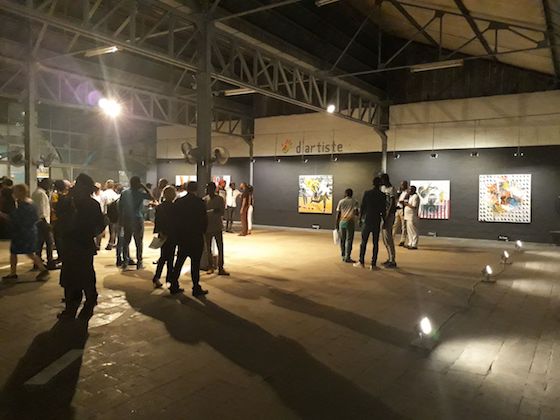 Who ist coming here? One of the few galleries in Kinshasa © Yvon Edoumou
Who ist coming here? One of the few galleries in Kinshasa © Yvon Edoumou
Across Africa, there are many initiatives intended to reduce the gap between the art world and those for whom art remains a distant planet. All the examples link back to access, making the enjoyment of arts accessible to the masses as much as possible. It's nothing less than an attempt to democratize art.
Yes, poor people can enjoy arts in Kinshasa.
Taking the arts closer to the people
There's a need to take the access issue further by actually taking the arts closer to the people, taking it to their neighborhood so that they understand that art doesn't have to be only for elitist families, living in posh neighborhoods, but that it can take place – and should take place – in the suburbs, slums and less-affluent neighborhoods.
Createquity, a now defunct website that was created to study the arts world, has an article on the reasons behind the lack of engagement with arts of low-income and less educated people. Among other things, the article says:
"People with lower incomes and less education (low-SES) participate at lower rates in a huge ranges of activities, including not just classical music concerts and plays, but also less 'elitist', forms of engagement like going to the movies, dancing socially, and even attending sporting events. (...) Cost is a barrier for some low-SES individuals who want to participate in the arts, but not as many as you might think. If we could somehow make it so that low-SES adults were no more likely to decide not to attend an exhibit or performance because of cost than their more affluent peers, it would hardly change the socioeconomic composition of audiences at all."
Collective therapy
Yes, poor people can enjoy arts in Kinshasa.
However, one of the biggest obstacles has been the way Congolese society, from the school system to the few in-country buyers, views arts.
To the Congolese government, I ask: Why are arts so invisible in the curriculum? To the directors of schools, I ask: When was the last time your school organized an outing to go visit an arts space? To the families, I ask: When was the last time you took your kids to an event? To the buyers, I ask: When was the last time you bought a painting without bargaining, negotiating so that the artist significantly cut the price on the painting?
Participation in cultural life is a human right
The issue of accessing and enjoying arts needs to be placed within the framework of changing the way the society as a whole approaches arts and culture, the value we give it, the overt and subvert messages that we transmit on the value of arts, particularly to those who are poor and less affluent who see arts as a remote, unattainable, far-flung planet.
It also needs to be placed in a human rights debate with the articles 19 and 27 that relate to the enjoying of arts, freedom of expression, participation in cultural life, and measures being taken to ensure that this cultural right is preserved and promoted at the same level as all other rights.
The Kinshasa arts scene is alive. It may be embryonic, but it does have something to offer: both to the rich and to the poor – with the poor needing it more.
1) https://www.managementstudyguide.com/maslows-hierarchy-needs-theory.htm
![]() Yvon Edoumou, a national of Côte d'Ivoire, lives in Kinshasa, DR Congo. He runs a blog on https://medium.com/@malabofame
Yvon Edoumou, a national of Côte d'Ivoire, lives in Kinshasa, DR Congo. He runs a blog on https://medium.com/@malabofame
Hier die deutsche Übersetzung dieses Artikels.
Here Milisuthando Bongela writes about the situation of cultural journalism on the African continent.
This text is a product of "Theaterformen" festival's journalistic project "Watch & Write" and is being published on nachtkritik.de in the context of a media cooperation with the festival. It is not part of the regular programme on nachtkritik.de.
Braunschweig, 8. Juni 2018
Have you eaten today?
by Yvon Edoumou
A few days ago, I attended the latest edition of the Kinshasa international theatre festival. 10 US dollars was the admission price to see one show, "Les Bonnes" ("The Housemaids"), a fabulous piece on two housemaids who want to kill their vicious employer. In Kinshasa, 10 US dollars for a show doesn't sound too much – or does it?
Or how about 20 dollar for the African classic "When Things Fall Apart" at Kinshasa's best bookstore? How about 50 dollar for a Koffi Olomide concert? How about for free? Remember: We are in Kinshasa, capital of DR Congo, a country that has occupied the lower ranks of all human development reports in over a decade.
 Construction is underway for a new museum in Kinshasa © Yvon Edoumou
Construction is underway for a new museum in Kinshasa © Yvon Edoumou
For the past years, I've been having an ongoing debate with a good friend on the place and importance of arts in Congolese society, and how poverty affects, influences the ability to enjoy arts for millions of people. To put it bluntly, leaving aside for a minute political correctness: Can poor people enjoy arts and culture?
By "poor", I am talking about housemaids – not the President's housemaids, but the ones that mere mortals employ who earn just enough for food and rent; those for whom having one decent meal is a daily challenge. I am thinking about the average Congolese police officer who earns about 100 dollar per month. And how about the millions of jobless young men and women with no prospect?
My friend has been arguing that until the majority of Congolese are able to satisfy their basic human needs, arts and culture remain a far-fetched dream, a thing only for ceux qui sont rasassiés – those whose bellies are full. Only them can afford to turn to less material things.
To support his opinion, I told him about Abraham Maslow and his famous Maslow pyramid of needs – talk about giving the stick so that your foe can beat you with it! Never heard of Maslow?
This theory is based on the assumption that there is a hierarchy of five needs within each individual. As each of these needs is satisfied, it drives the next need to emerge. The theory assumes that it is difficult to meet the next need if the previous one hasn't been significantly satisfied. These five needs are:
1. Physiological needs – the basic needs of air, water, food, clothing and shelter.
2. Safety needs – those include physical, environmental and emotional safety and protection. For instance Job security, financial security, protection from animals, family security, health security, etc.
3. Social needs – the need for love, affection, care, belonging, and friendship.
4. Esteem needs – esteem needs are of two types: internal esteem needs (self-respect, confidence, competence, achievement and freedom) and external esteem needs (recognition, power, status, attention and admiration).
5. Self-actualization need – This includes the urge to become what you are capable of becoming / what you have the potential to become. It includes the need for growth and self-contentment. It also includes desire for gaining more knowledge, social service, creativity and being aesthetic. The self-actualization needs are never fully satiable. As an individual grows psychologically, opportunities keep cropping up to continue growing.
Of course the theory has its limitations, and interesting enough some critics have said that the theory is not applicable in case of "starving artist as even if the artist's basic needs are not satisfied, he will still strive for recognition and achievement."1
It's not only about the money
Yes, my friend is right: the poor has priorities and arts is not one of them. Hard to spend money on a 20-dollar-book when that amount represents two-weeks' worth of food for your family.
However, the debate should not only revolve on money and the cost of a play, a book or a painting. The bigger issues are having access to these cultural goods, promoting public and private initiatives so that the poor can enjoy arts, and more importantly breaking down the mental barriers around arts.
Yes, poor people can enjoy arts in Kinshasa.
In Kinshasa, there are numerous places and initiatives where one can enjoy arts, starting with the galleries at the Academie des beaux Arts de Kinshasa. The French and Belgian cultural centers regularly offer free entrance to shows and concerts. The Texaf Bilembo Cultural Center, a former textile factory, offers free access to its exhibits. Last month, Congolese artists and aficionados were able to listen to a talk by internationally renowned Cameroonian artist, Barthelemy Toguo. The latest kid on the block, the Kin ArtStudio, an arts residence managed by artist Vitshois Mwilambwe Bondo, where one can meet and talk with emerging artists such Eddy Ilunga and Francis Tenda, is open to the public all the week long. For five dollars – fees for nationals – one can visit the Kinshasa museum.
 Who ist coming here? One of the few galleries in Kinshasa © Yvon Edoumou
Who ist coming here? One of the few galleries in Kinshasa © Yvon Edoumou
Across Africa, there are many initiatives intended to reduce the gap between the art world and those for whom art remains a distant planet. All the examples link back to access, making the enjoyment of arts accessible to the masses as much as possible. It's nothing less than an attempt to democratize art.
Yes, poor people can enjoy arts in Kinshasa.
Taking the arts closer to the people
There's a need to take the access issue further by actually taking the arts closer to the people, taking it to their neighborhood so that they understand that art doesn't have to be only for elitist families, living in posh neighborhoods, but that it can take place – and should take place – in the suburbs, slums and less-affluent neighborhoods.
Createquity, a now defunct website that was created to study the arts world, has an article on the reasons behind the lack of engagement with arts of low-income and less educated people. Among other things, the article says:
"People with lower incomes and less education (low-SES) participate at lower rates in a huge ranges of activities, including not just classical music concerts and plays, but also less 'elitist', forms of engagement like going to the movies, dancing socially, and even attending sporting events. (...) Cost is a barrier for some low-SES individuals who want to participate in the arts, but not as many as you might think. If we could somehow make it so that low-SES adults were no more likely to decide not to attend an exhibit or performance because of cost than their more affluent peers, it would hardly change the socioeconomic composition of audiences at all."
Collective therapy
Yes, poor people can enjoy arts in Kinshasa.
However, one of the biggest obstacles has been the way Congolese society, from the school system to the few in-country buyers, views arts.
To the Congolese government, I ask: Why are arts so invisible in the curriculum? To the directors of schools, I ask: When was the last time your school organized an outing to go visit an arts space? To the families, I ask: When was the last time you took your kids to an event? To the buyers, I ask: When was the last time you bought a painting without bargaining, negotiating so that the artist significantly cut the price on the painting?
Participation in cultural life is a human right
The issue of accessing and enjoying arts needs to be placed within the framework of changing the way the society as a whole approaches arts and culture, the value we give it, the overt and subvert messages that we transmit on the value of arts, particularly to those who are poor and less affluent who see arts as a remote, unattainable, far-flung planet.
It also needs to be placed in a human rights debate with the articles 19 and 27 that relate to the enjoying of arts, freedom of expression, participation in cultural life, and measures being taken to ensure that this cultural right is preserved and promoted at the same level as all other rights.
The Kinshasa arts scene is alive. It may be embryonic, but it does have something to offer: both to the rich and to the poor – with the poor needing it more.
1) https://www.managementstudyguide.com/maslows-hierarchy-needs-theory.htm
![]() Yvon Edoumou, a national of Côte d'Ivoire, lives in Kinshasa, DR Congo. He runs a blog on https://medium.com/@malabofame
Yvon Edoumou, a national of Côte d'Ivoire, lives in Kinshasa, DR Congo. He runs a blog on https://medium.com/@malabofame
Hier die deutsche Übersetzung dieses Artikels.
Here Milisuthando Bongela writes about the situation of cultural journalism on the African continent.
This text is a product of "Theaterformen" festival's journalistic project "Watch & Write" and is being published on nachtkritik.de in the context of a media cooperation with the festival. It is not part of the regular programme on nachtkritik.de.
Schön, dass Sie diesen Text gelesen haben
Unsere Kritiken sind für alle kostenlos. Aber Theaterkritik kostet Geld. Unterstützen Sie uns mit Ihrem Beitrag, damit wir weiter für Sie schreiben können.
mehr nachtkritiken
meldungen >
- 17. April 2024 Autor und Regisseur René Pollesch in Berlin beigesetzt
- 17. April 2024 London: Die Sieger der Olivier Awards 2024
- 17. April 2024 Dresden: Mäzen Bernhard von Loeffelholz verstorben
- 15. April 2024 Würzburg: Intendant Markus Trabusch geht
- 15. April 2024 Französischer Kulturorden für Elfriede Jelinek
- 13. April 2024 Braunschweig: LOT-Theater stellt Betrieb ein
- 13. April 2024 Theater Hagen: Neuer Intendant ernannt
- 12. April 2024 Landesbühnentage 2024 erstmals dezentral


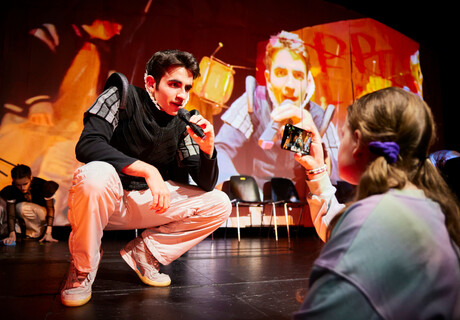
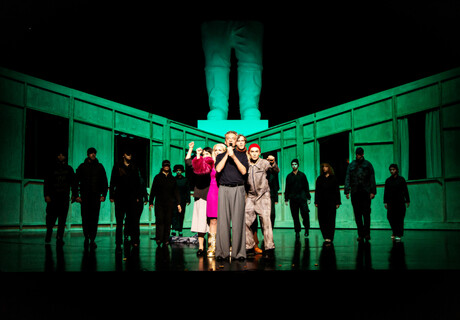
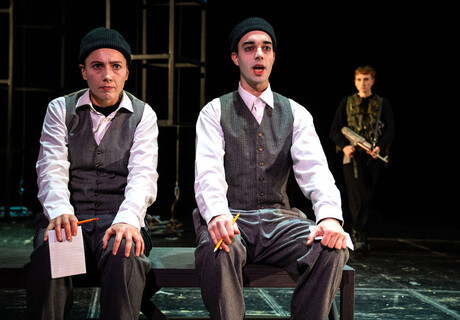
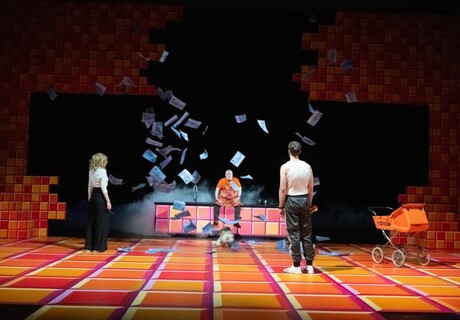
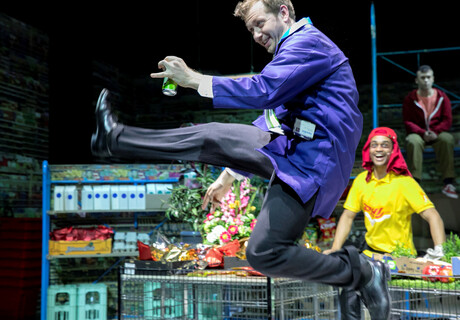
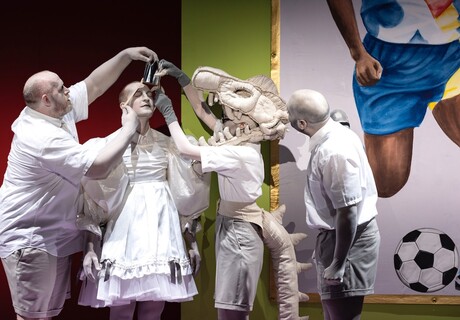
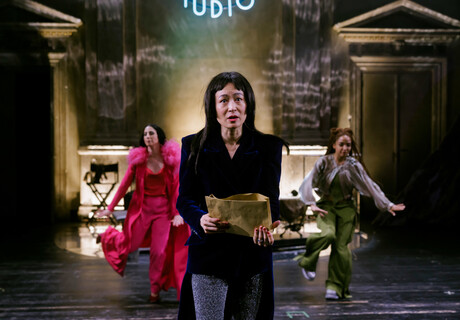
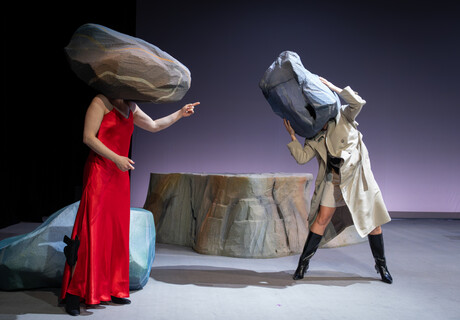
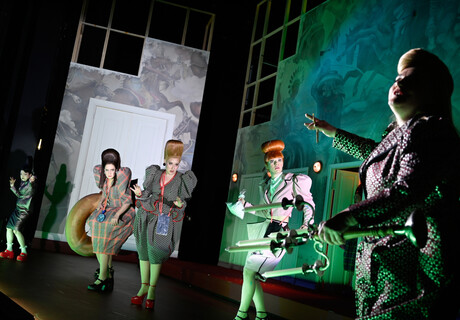
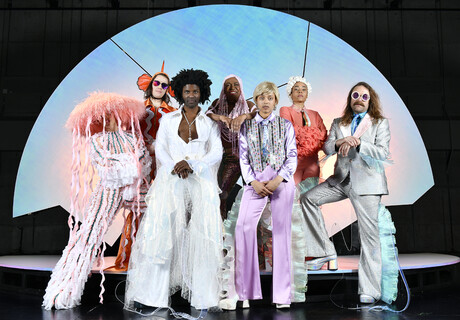
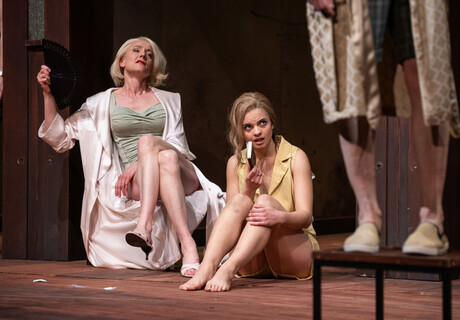
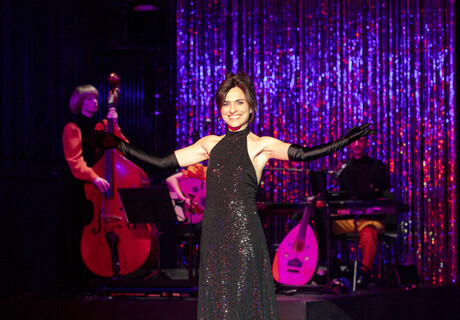
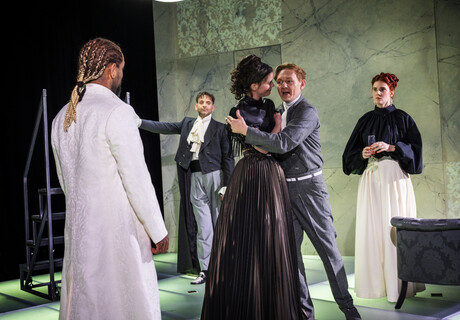
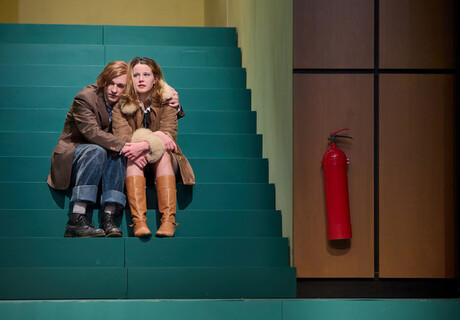
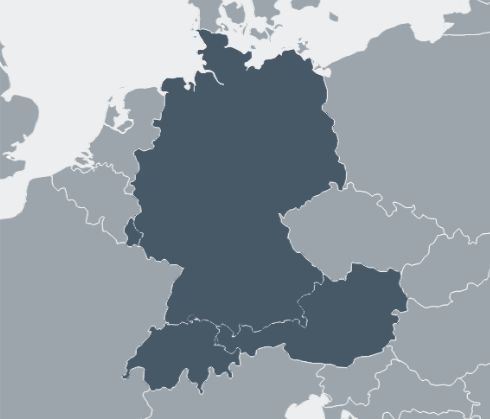
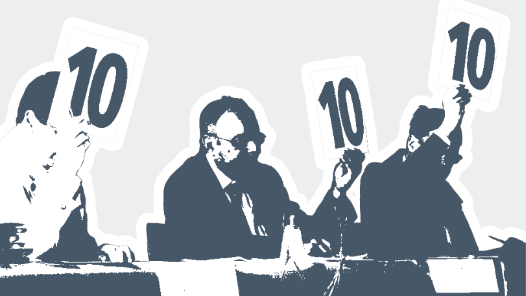
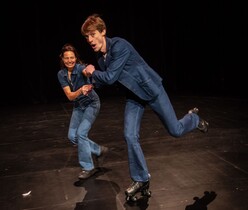



neueste kommentare >